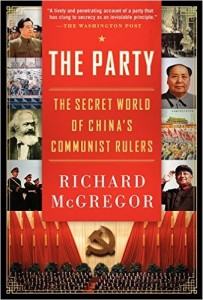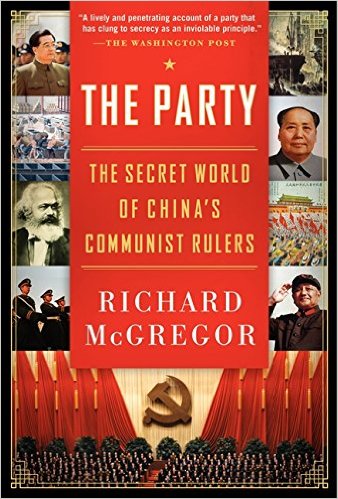 I meant to blog about many of these individually, but after two months it has not happened, so here is a list of impressions. Not all the books are excellent. They run from the best to the least worth reading, but all are worth reading (I don’t blog about the duds).
I meant to blog about many of these individually, but after two months it has not happened, so here is a list of impressions. Not all the books are excellent. They run from the best to the least worth reading, but all are worth reading (I don’t blog about the duds).
- The Party by Richard McGregor. Best book I read this year. A former FT journalist in China gives you the fascinating inner workings of the Communist party. I am not a China expert, so I can’t say if any of this is accurate, but it was the most thought-provoking book on the politics of development I can recall in a while. How corruption and cronyism produce growth when the political system is durable yet flexible. Best paired with this article by Chang Tai Hsieh: “Crony Capitalism with Chinese Characteristics“
- Between the World and Me by Ta-Nehisi Coates. I did not find the whole “letter to my son” device as skillful or convincing as others, and the writing is not his best, but more important than any of that: the book is full of powerful ideas and insights. Also, this is the only book about black people that every white liberal intellectual in the country has read, and they’re going to talk about it all the time as if they are experts on oppression. So you might as well know what they are bullshitting about.
- Three Body Problem by Cixin Liu. A Chinese science fiction novel translated into English. The writing is a bit awkward at times, which might be the writer or the translator. But worth it in the end.
- Seveneves by Neal Stephenson. A much better science fiction novel, even if it sometimes feels like a worse Cloud Atlas.
- The Black Count by Tom Reiss. Alexandre Dumas (author of The Count of Monte Cristo and The Three Musketeers, had a father who was Haiti-born, black, and one of the greatest generals of revolutionary France. A history of the slave trade and the revolution, but written well enough you actually want to read it.
- Minute Zero by Todd Moss. Book two about an Ivy league political science professor who runs conflict regressions and then unwittingly saves the world with the help of the CIA. I mean, what’s not to love (from a purely self-interested perspective)?
- The Fishermen by Chigozie Obioma. Nigeria is probably one of the countries with the most interesting and innovative 21st century fiction. This book is a novel about a Nigerian boy, beautifully written. It cannot be accused of sounding like Adichie or Achebe, which I mention only because there’s a rule that every review of a Nigerian author has to mention those two people.
- The UnAmericans by Molly Antopol. Short stories on American immigrants, with a common Eastern European thread running through many.
- A Primate’s Memoir by Robert Sapolsky. An irritating neuroscientist/primatologist recounts his experiences and exploits among baboons. His insights into primates and his academic field are good enough that they are worth listening to his self-congratulatory stories. Also, throughout the book I kept thinking, “Maybe when I am 70 I too will write a memoir, and no doubt I too will sound like a complete ass to someone 30 years my junior.” So all is forgiven. And in 30 years please forgive me.


12 Responses
“this is the only book about black people that every white liberal intellectual in the country has read” ~ @cblatts https://t.co/qo7ZW41ml6
RT @cblatts: Nine short book reviews for busy people https://t.co/Bv8fAjhyaA
RT @cblatts: Nine short book reviews for busy people https://t.co/Bv8fAjhyaA
RT @cblatts: Nine short book reviews for busy people https://t.co/Bv8fAjhyaA
RT @cblatts: Nine short book reviews for busy people https://t.co/Bv8fAjhyaA
Nine short book reviews for busy people https://t.co/Bv8fAjhyaA
What I’ve been reading: I meant to blog about many of these individually, but after two months it has not happ… https://t.co/3rqVsEMvVE
RT @fp2p: What @cblatts has been reading (yep, he reads books). The Party sounds great https://t.co/EsbSuuoc2v
I had the same weird feeling about the writing in “The Three Body Problem”. But I thought this quote by the translator (found in the translator’s notes in the end) put this into perspective:
“In translating, my goal is to act as a faithful interpreter preserving as much of the original’s nuances of meaning as possible without embellishment or omission. Yet a translator must also balance fidelity to the source, aptness of expression, and beauty of style. The best translations into English do not, in fact, read as if they were originally written in English. The English words are arranged in such a way that the reader sees a glimpse of another culture’s patterns of thinking, hears an echo of another language’s rhythms and cadences, and feels a tremor of another people’s gestures and movements.”
I had the feeling this was a very “Chinese” book (if that makes any sense) and in hindsight the translation added to that feeling. So, while I disliked the writing in the beginning, I came to think of it more of a “feature than a bug”.
What @cblatts has been reading (yep, he reads books). The Party sounds great https://t.co/EsbSuuoc2v
@poverty_action or if @cblatts & @MargRev coordinate their reading posts! https://t.co/5lEn4Y5nht
Is anybody else wondering if @Cblatts has been using his IPA RAs to read books for him? https://t.co/jvjFArBAKR